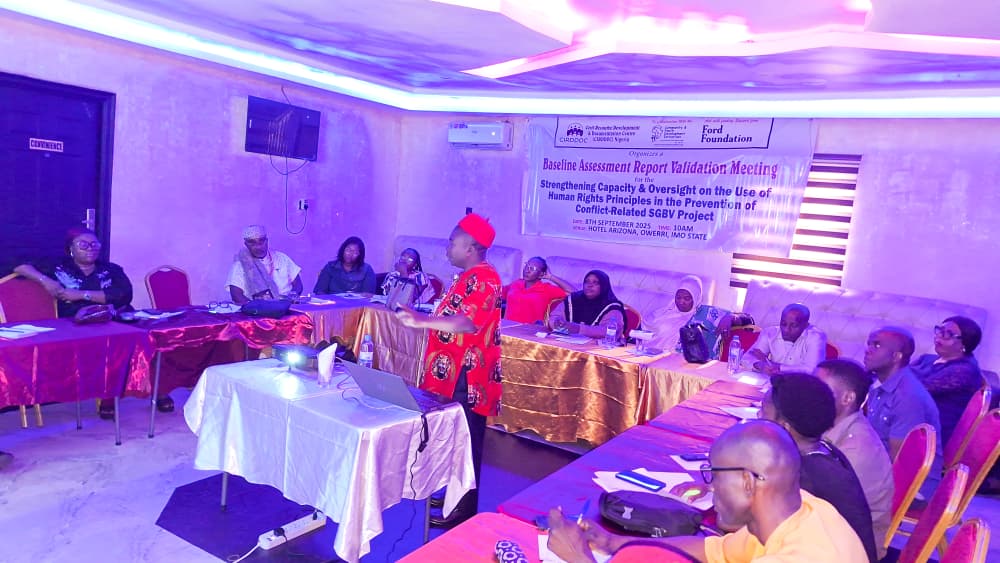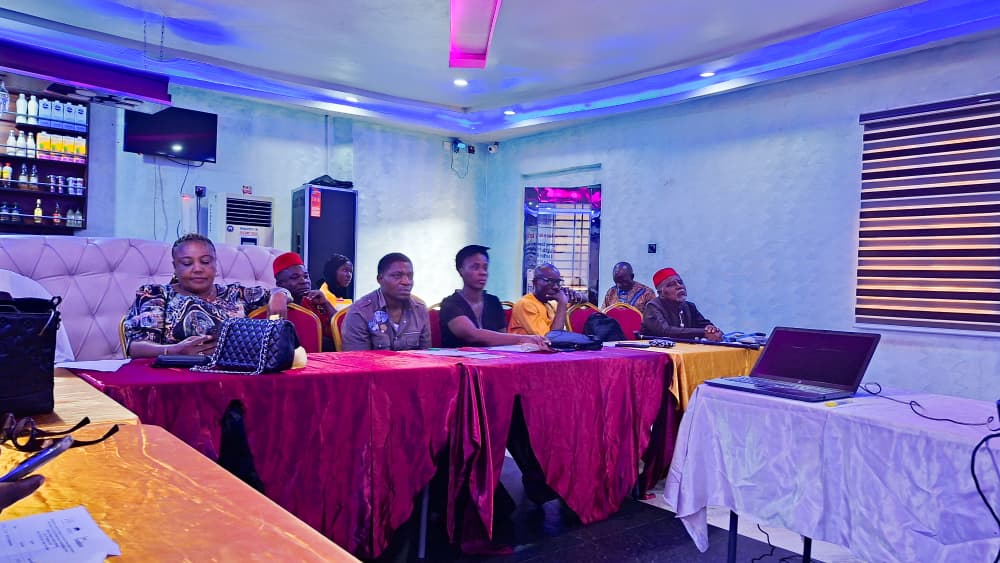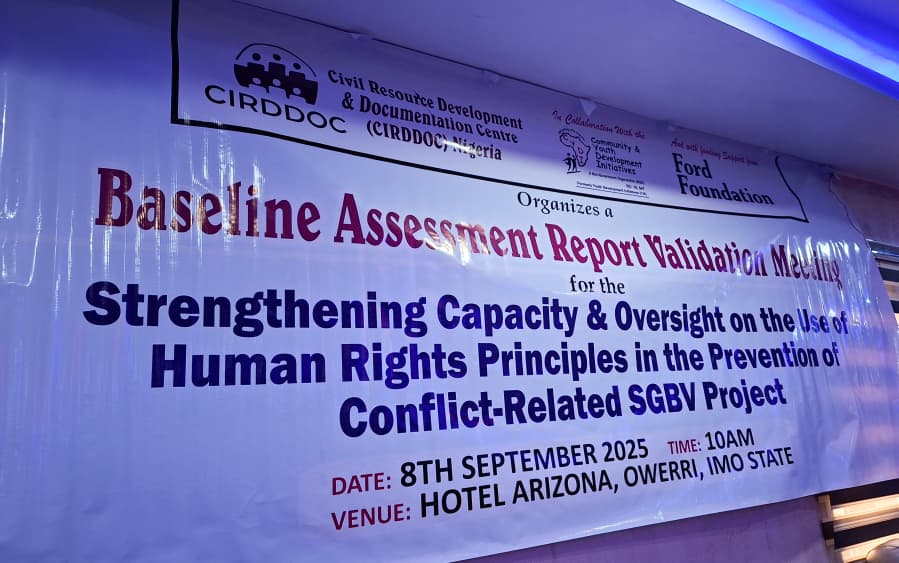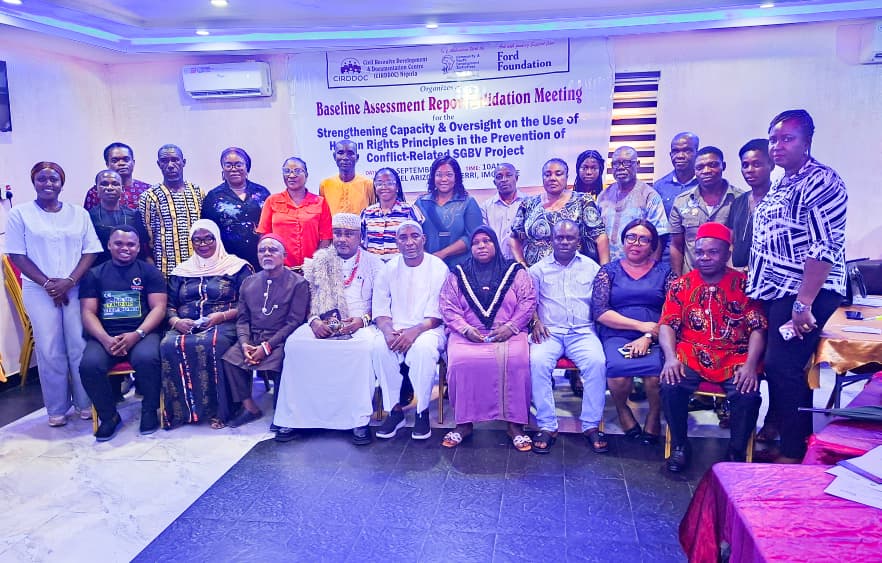By Harriet Ijeomah
The wave of insecurity that swept across Nigeria’s Southeast since 2021 sparked by separatist agitations, violent enforcement of sit-at-home orders, Farmer herders clash, kidnapping, rising cult and militia activity and others has deepened fears about sexual and gender-based violence (SGBV) in communities caught in conflict.
On Monday, 8 September 2025, the Civil Resource Development and Documentation Centre (CIRDDOC), in collaboration with the Community Youth Development Initiatives (CYDI) and with support from the Ford Foundation, convened a Baseline Assessment Report Validation Meeting in Owerri for the strengthening capacity and oversight on the use of Human Rights Principle in the Prevention of Conflicts Related SGBV Projects.
A backdrop of insecurity
The crisis in the Southeast escalated in early 2021, following the arrest and extradition of Indigenous People of Biafra (IPOB) leader, Nnamdi Kanu. The development triggered violent sit-at-home orders and widespread unrest. Security analysts say attacks on checkpoints, abductions, and communal clashes surged thereafter.
Amnesty International reported that at least 1,844 people were killed in the region between January 2021 and June 2023, attributing the deaths to armed groups, cultists, security agencies, and the government-backed Ebube Agu militia. The instability has left many communities vulnerable to abuses, including sexual and gender-based violence.
Conflict and SGBV: A dangerous intersection
While official data show 27,698 SGBV cases recorded nationwide between 2020 and 2023, These data masks the dire realities in conflict zones like Imo. In January 2025 alone, civil society organisations recorded a 240 per cent increase in femicides compared to the same month the previous year, fuelling calls for a state of emergency on gender-based violence.
“The breakdown of security creates conditions where women and girls face greater risks,” said one participant at the Owerri meeting, stressing that unresolved conflicts heighten vulnerability to sexual exploitation, domestic violence, and displacement.

Building evidence for action
At the validation meeting, CIRDDOC’s Project Officer, Pascal Anozie, said the exercise was critical for grounding interventions in evidence.
“We invited stakeholders to review and validate the findings so that at the end of implementation, we can measure impact. Every input here will be reflected in the report. Research like this gives CSOs, government agencies, and the media a base for planning and action,” he said.
The research, led by consultant David Onyinyechi Agu, assessed conflict-related SGBV trends in Imo and Benue States, focusing on three communities across Imo’s geopolitical zones: Umuokanne in Ohaji/Egbema (Orlu Zone), Orogwe in Owerri West (Owerri Zone), and Okigwe Urban (Okigwe Zone).
Mr Agu explained that the goal was to document realities on the ground and generate actionable recommendations for government, traditional leaders, CSOs, and the media.
Data Gaps Undermine SGBV Interventions in Imo State
The Executive Director of CYDI and State Programme Officer for the project, Felxfame Enisire, emphasized that one of the major challenges faced by Civil Society Organizations (CSOs) in holistically addressing Sexual and Gender-Based Violence (SGBV) in Imo State is the absence of harmonized and reliable data to guide interventions. He noted that the state lacks a centralized data bank for warehousing SGBV-related cases, a gap that significantly undermines evidence-based policy decisions and programming in the state.
As a result, CSOs are often compelled to conduct fresh baselines before implementing any SGBV-focused project, while others are forced to rely on generalized national surveys such as the Multiple Indicator Cluster Survey (MICS) and the Nigeria Demographic and Health Survey (NDHS), which do not reflect the peculiar realities of all Local Government Areas (LGAs) in Imo State. This, he stressed, not only weakens the impact of programming but also limits the ability of stakeholders to effectively design targeted interventions that respond to the true scale and dynamics of SGBV in the state.

Human rights perspective
Barr. Ihunanya Okoroji, a gender justice advocate with the National Human Rights Commission (NHRC) in Imo, described the study as “extensive and data-driven,” grounded in real-time experiences of victims.
“This research helps us understand how far interventions are working and whether laws protecting human rights are being enforced in practice,” she said. She urged CSOs and government agencies to invest more in research and documentation, noting that reliable data are essential to shaping policies on SGBV.
Community leaders weigh in
Traditional institutions also backed the initiative. HRH Eze (Dr) M.C. Nwokeoma, Okaome IV of Umuokanne Ancient Kingdom and Chairman of the Imo State Council of Traditional Rulers’ Committee on Security, Peace and Conflict Resolution, commended CIRDDOC’s efforts.
“Findings like this are a welcome development. They provide a basis for correcting abnormal situations in our communities,” he said.

Why it matters
The validation of CIRDDOC’s baseline report signals an important step in confronting the hidden toll of insecurity in the Southeast: the violence directed at women and girls. By combining community voices, rights-based principles, and data-driven evidence, stakeholders in Imo are laying groundwork for more effective interventions that address both conflict and SGBV.
The final report, once published, is expected to guide government agencies, civil society, and traditional institutions in designing policies and programmes that protect vulnerable populations in conflict-affected communities.





